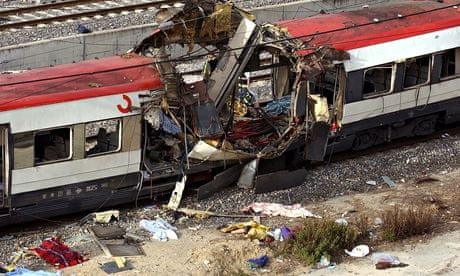Among many other famous paintings, the Reina Sofia Museum in Madrid houses Picasso's Guernica. Art's most iconic indictment of mindless violence looked unfairly soft on the morning of 11 March 2004 when the real thing materialised just a few hundred metres down the street. A train packed with commuters had been torn apart by three powerful explosions. Then in the next two minutes – between 07:37 and 07:39 precisely – another seven bombs went off in three different trains, killing 191 people and injuring or maiming almost 2,000. It was the worst terror attack in Spain's history, the work of a radical Jihadist cell loosely linked to al-Qaida.
Ten years later, there are few visible signs of what happened on that day. Even the shadow of things, commemoration, has a discreet presence. There is the 11-metre-high crystal monolith erected in tribute to the victims outside Atocha station where one of the trains exploded; but the memorial across the street is perhaps more moving. Known as the Forest of Remembrance, it is a little park with olive trees and cypresses, one for each of the victims. It is calm and collected; a place to be, rather than a monument to observe.
I wish the legacy of 11 March was as simple as that park. It isn't. Grief is easy to share, but when it comes to meaning Spain's memory of the Madrid train bombings appears fatally tainted by domestic politics; and when one thinks of the magnitude of the tragedy it is almost embarrassing to explain why.
The attacks occurred just three days before a hotly contested general election. In this polarised context the obsession arose that the interpretation of the events would swing the vote in one direction or the other: if the attacks had been the work of the Basque separatist group Eta, the ruling Conservatives might win by a landslide because they were seen as tougher on separatism; if the attack turned out to be Islamist it was assumed this would benefit the opposition Socialists, who had warned of the danger of supporting the invasion of Iraq a year beforehand.
Of course, this was pure speculation, yet another example of political spin gone mad. After all, why should anyone blame the attacks on anyone other than the perpetrators? But paranoia took over. In spite of the early evidence pointing to Muslim radicals, the government panicked, engaged in a selective reading of the facts, and pressed hard the case for Eta's responsibility.
So hard, in fact, that when the truth was known the government's actions could only be interpreted as deception rather than delusion, and the incumbent Conservatives were defeated at the polls. In their frustration they stuck to the conviction that it had not been an Islamist attack. Ten years on many Conservatives still do, even if the courts settled the issue a long time ago, even after they eventually returned to power. The "conspiracy theory", as it is known, has become some sort of a nostalgic cult, the intense desire to have been always right.
And that is the real explanation of something that often surprises foreigners: the fact that there was no backlash against Spain's Muslim population after the attacks. I have been asked many times if this could be a remnant of Spain's fabled – and often exaggerated – days of religious tolerance in the middle ages. It isn't. Spain ranks among the most religiously tolerant countries in Europe. But in this case it was simply that people's anger was directed elsewhere – against each other. We became our own scapegoats.
What is unfortunate is that the controversy continues to affect the way in which the tragedy is remembered in Spain. Official commemorations avoid speeches. If there are speeches, specifics are left out. What was an act of mass murder tends to be treated in terms of abstract evil. But there might be a silver lining here too. In a way, this lack of interpretation has made it more universal – like Guernica, hanging on a wall a few hundred metres up the street.
